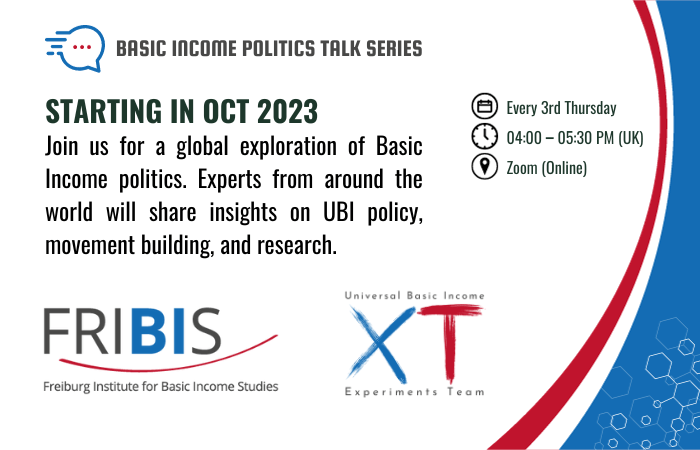
- Diese Veranstaltung hat bereits stattgefunden.
Politics of Basic Income Talk Series – Emergency basic income: Distraction or Opportunity – May 16th at 4pm
Mai 16, 2024 @ 4:00 pm - 5:30 pm


Abstract:
The COVID-19 crisis did more than provide a boost to cash transfer schemes in general. It also appeared to briefly open up a policy window for one very specific type of cash transfer programme, and the focus for this set of papers: Emergency basic income (EBI), which is the time-limited variant of the more familiar Universal Basic Income (UBI). Against the backdrop of a rapidly evolving health and economic crisis requiring a swift and agile policy response, the idea of providing the vast majority of citizens with immediate unconditional cash support for a time-limited period gained considerable traction with decision makers as well as the general public (Nettle et al., 2021; Gentilini, 2022; Patulny and Spies Butcher, 2023). The EBI proposal piggy-backed on a decade of increasing policy interest in (and even political support for) the basic income proposal, following a global series of pilots, experiments, referenda and political campaigns spearheaded by the two-year Finnish trial in 2017–2018 (Laenen, 2023; De Wispelaere, Halmetoja and Pulkka, 2023). However, where the original basic income proposal typically falters when faced with hard questions about financing, the pandemic effectively opened the floodgates to unprecedented levels of public spending. In the context of developing an urgent pandemic emergency response, policy makers were frantically searching for a policy tool that could effectively disburse the vast amounts of cash made available by decision makers who had, temporarily, abandoned the austerity mindset. Basic income presented itself as a ready-made model that can be adapted to specific local circumstances, and several countries proceeded to implement cash transfers that mimic EBI in key respects.
The EBI model opens up a series of interesting questions for policy analysts and social protection scholars alike. A first set of questions focus on how the EBI model interfaces with existing social protection systems. The experience of the COVID-19 pandemic suggests some superficial synergies between EBI and especially universal social protection measures, but the existence of more profound differences in design and implementation may hamper any facile integration of the two. The extent to which the EBI model might be able to build on existing social protection programmes, or perhaps even fuel a change towards designing and instituting less targeted and more generous social protection policies in the near future, remains contentious. This is not only a matter of fitting EBI into pre-existing institutional arrangements but, critically, about overcoming historical barriers related to the design principles of contributory and general revenue-financed targeted systems.
An equally important set of question arises in relation to how EBI fits with the universal basic income (UBI) proposal, considering the clear contrasts both in design (temporary versus permanent) and context (short-term emergency versus long-term steady state). The basic income community itself is divided on whether to regard EBI as an opportunity to further boost the public awareness and policy support for basic income or as a distraction that will only sidetrack productive social protection development. This special themed issue is devoted to examining these and related questions in an attempt to chart the reception of EBI-type policies in specific country or regional contexts, and to reflect on the irrelevance for the future development of universal social protection in general and UBI in particular. The articles that comprise this issue build on a plenary session of the 21st BIEN Congress, held on 26–28 September 2022 in Brisbane, Australia, in which policy experts, representatives of INGOs and basic income scholars debated the merits and impact of the EBI proposal during the COVID-19 pandemic.
Speakers’ bios:
Jurgen De Wispelaere is a leading basic income scholar specialising in the politics of basic income. He has published extensively on this topic in international peer-reviewed journals, edited collections and also consulted for governments and international organisations such as World Bank and the Economic Commission for Latin America and the Caribbean. His current research focuses primarily on emergency basic income and crisis, the policy impact of basic income experiments, and the drivers and mechanics of the policy diffusion of municipal UBI schemes in Brazil. With Troy Henderson he co-edited the themed issue on Emergency Basic Income for the International Social Security Review (ISSR). Jurgen is an IPR Visiting Fellow at the Institute for Policy Research (University of Bath) and a Docent in the Faculty of Social Sciences at Tampere University. He the Research Coordinator of the Basic Income Earth Network (https://basicincome.org/).
Francesca Bastagli has extensive experience in the design, monitoring and evaluation of social policies, including cash transfers, with a particular interest in gender equality and labour market outcomes. She is author of numerous reports, articles and briefings on these topics, including Cash Transfers: What Does the Evidence Say? (2016), Universal Child Benefits (2020) and Universal Basic Income and Work (2021). Francesca is Head of Research and Policy at the Agnelli Foundation. She was previously Director, Equity and Social Policy, at ODI and has also held positions at the London School of Economics (LSE)’s Centre for Analysis of Social Exclusion (CASE) and at the World Bank. She holds a PhD in Social Policy from the LSE and a laurea in Economics from Bocconi University.
Starting in Oct 2023: Politics of Basic Income Talk Series!
Starting in October 2023 and continuing monthly on every 3rd Thursday, join us for a global exploration of Universal Basic Income (UBI) politics, hosted by the Bath UBI Beacon and Freiburg Institute of Basic Income Studies (FRIBIS), in partnership with the Basic Income Earth Network (BIEN). Experts from around the world will share insights on UBI policy, movement building, and research.
Find out more here.
